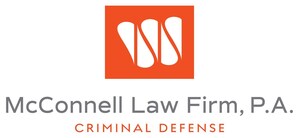WICHITA, Kan., April 22, 2024 /PRNewswire/ -- Tax season brings many added stressors to our daily lives—don't let criminal charges become one of them. While you may be lax with your tax filings, it's important to remain diligent when reporting your taxable income, as concealing assets or earnings could lead to severe consequences like tax evasion charges. If you find yourself facing allegations of tax evasion this season, it's crucial to contact a criminal defense attorney well-versed in such cases, like our white collar crimes attorneys in Wichita at the McConnell Law Firm. Keep reading and find out what you should do if charged with tax evasion.
Tax Evasion vs. Tax Avoidance
Before we delve into the specifics of tax evasion charges, it's important to understand the difference between tax evasion and tax avoidance. So, what exactly is tax evasion, and how is it different from tax avoidance?
Tax Evasion: Tax evasion involves deliberately underreporting income, overstating deductions, or concealing assets to reduce tax liability illegally. It is a criminal offense and is prosecuted aggressively by tax authorities.
*It's important to note that tax evasion involves willful attempts to avoid assessment or evade tax payment.
Tax Avoidance: Tax avoidance, on the other hand, refers to utilizing legal methods to minimize tax liability within the bounds of the law. Strategies such as claiming legitimate deductions, credits, and exemptions are examples of legal tax avoidance.
"Taxes are inherently difficult," said Jonathan W. McConnell, founding white collar crimes attorney at the McConnell Law Firm. "The rules are very complex and arduous to follow, so it's understandable that people make mistakes on tax returns. Tax evasion, however, comes down to the underlying intention. If you've made mistakes without intentional conduct, you may be subject to repaying the tax with penalties and interest. Deliberately lying on a return becomes a criminal offense, which may result in a misdemeanor or a felony charge, depending on factors like time and the amount of money you've failed to report."
Penalties for Tax Evasion
In Kansas, individuals and corporations can be charged with felony tax evasion, which may result in the following penalties:
Fines and Restitution: Convicted individuals may be required to pay substantial fines and restitution for unpaid taxes. The amount of restitution is typically equivalent to the taxes evaded plus any applicable penalties and interest. An individual may face fines up to $100,000, and corporations can expect fines up to $500,000.
Prison Time: In serious cases of tax evasion, individuals may face a prison sentence. The length of imprisonment depends on factors such as the amount of tax evaded, the duration of the evasion, and the individual's criminal history.
Loss of Professional Licenses: Professionals, such as lawyers, accountants, or financial advisors, convicted of tax evasion may face additional penalties, including the loss of their professional licenses or certifications.
What To Do if You've Been Charged
If you've been charged with tax evasion, immediately consult with an experienced criminal defense attorney specializing in tax law. Because some attorneys who specialize in tax law may not have experience in criminal defense, it's not uncommon for tax attorneys, Certified Public Accountants (CPAs), and defense attorneys to join forces on complicated tax evasion cases. Together, your attorneys can assess your case, explain your rights, and develop a defense strategy tailored to your specific situation.
"Remember, if you have someone prepare your return, you're still responsible for affirming that it's correct," said McConnell. "Make sure you're vigilant when looking at your return, even if the person preparing your return is a spouse. You are subject to your spouse's liability and can face the same penalties or criminal charges, so it's best not to put your future in the hands of another person."
Have You Been Accused?
If you need assistance with a tax evasion case, we encourage you to contact the McConnell Law Firm as soon as possible. While every case is different, and no conclusions should be drawn without first consulting one of our white collar crime attorneys about the specifics of your case, it is always in your best interest to have a skilled attorney by your side from the beginning.
Request a Free Consultation
Do you or a loved one need the assistance of an expert white collar crimes attorney? We encourage you to contact the McConnell Law Firm at (316) 243-5903 for a free consultation.
SOURCE McConnell Law Firm

WANT YOUR COMPANY'S NEWS FEATURED ON PRNEWSWIRE.COM?
Newsrooms &
Influencers
Digital Media
Outlets
Journalists
Opted In



Share this article